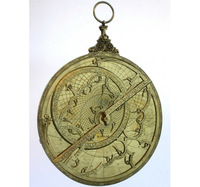Florence hosts major Galileo exhibition
 In a year of celebrations to commemorate Galileo Galilei, the Palazzo Strozzi will be hosting a major exhibition illustrating the extraordinary human and intellectual adventure that eventually gave us our current vision of the Universe.
In a year of celebrations to commemorate Galileo Galilei, the Palazzo Strozzi will be hosting a major exhibition illustrating the extraordinary human and intellectual adventure that eventually gave us our current vision of the Universe.Galileo tells the story of how the Cosmos was envisioned and represented from ancient times right up to the Scientific Revolution, in the context of the history and culture of Mediterranean and European civilization. This fascinating journey begins with the mystic and poetic visions of Egypt and Mesopotamia, before the Greeks.
It moves on to examine the inspired heavenly spheres of Eudoxus of Cnidus and the complex architecture of the Ptolemies. Then, after dwelling on the crucial contribution that the Arabs made to the science of astronomy and on the Christian approach to the concept of the Universe, it ends with the revolutionary theory devised by Copernicus that inspired both Galileo and Johannes Kepler. In expounding the case for the theory of heliocentricity against objections raised by Danish astronomer Tycho Brahe, Galileo and Kepler were instrumental in ensuring that the new view of the Universe ultimately prevailed.
This intriguing journey through history will be spectacularly illustrated with archaeological finds, a number of exceptionally beautiful and inspired scientific instruments, maps of the heavens, drawings, paintings, sculptures and precious illuminated manuscripts from the world's most prestigious museums and libraries. Working cosmological models specially built for the exhibition will be set alongside the exhibits, while multimedia applications and captivating film material will offer a more in-depth look at some of the issues that the exhibition addresses.
The exhibition also highlights the intense and ongoing interplay between astronomy and astrology and, on a more general level, the aspects of astral science that have had a direct impact on the fears and hopes of man.
Other areas which the exhibition will be looking at in equal depth include the relationships between cosmology and power and cosmology and medicine, as well as the theory of the stars' influence on a person's character and inclinations, while at the same time underscoring the fascination that the theme of cosmology held for many artists. In that connection, the case of Albrecht Dürer and, on a more general level, of the relationship between melancholy and Saturn, is emblematic.
In a special section devoted to the invention of the telescope, Galileo's sole original telescope to have survived (from the Museo di Storia della Scienza in Florence) will be on display, alongside multimedia tools designed to shed light on this instrument's crucial role and to illustrate the results of recent investigations conducted by an interdisciplinary research group. In the section on Galileo, it will be possible to track the increasingly accurate mapping of the moon's surface, the consequences of the discovery of Jupiter's satellites, and the huge impact that astronomical discoveries had on the art of the time.
The exhibition will be accompanied by a richly illustrated catalog and by a DVD containing simulations of the main systems in the world, while also illustrating the most important scientific instruments and the way they work. A website will provide access to, among other things, more in-depth content and special programs for schools.
For more information, log on to Palazzostrozzi.org.
Opening hours: Daily 9,00 – 20,00
Thursday 9,00 – 23,00
Last admission to the exhibition one hour before closing
Admission: full € 10,00; reduced € 8,50 € 8,00 € 7,50 schools € 4,00
For more information on tourism in Italy, see italiantouristboard.co.uk.

